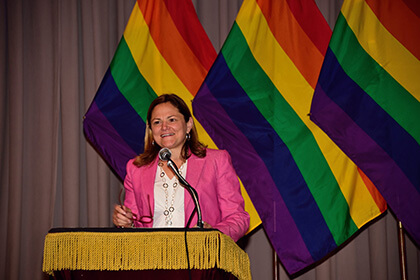New York Senator Chuck Schumer in Manhattan's 2012 LGBT Pride Parade. | MICHAEL LUONGO
As debate over immigration reform moves center stage in the US Senate –– with the Judiciary Committee holding hearings and more than 50 binational same-sex families descending on Capitol Hill this week for visits with 150 members of Congress –– advocates for couples in which one member is not an American citizen remain concerned they could be left out of the legislation as it moves forward.
“I was troubled to hear some Democrats sound hesitant about LGBT inclusion,” said Rachel Tiven, the executive director of Immigration Equality, which works on issues affecting LGBT and HIV-affected immigrants. “I think we have to ask a question of the Democrats who have been –– especially of Democrats, who have been tripping over each other to espouse their support for marriage equality. When actual legislation is on the table, are they abandoning LGBT families?”
Schumer, Leahy signal continued commitment, but no roadmap; Feinstein’s posture uncertain
An immigration reform bill crafted by a bipartisan group of senators –– the so-called Gang of Eight –– failed to incorporate the Uniting American Families Act (UAFA), which would allow American citizens to bring their same-sex partners into the US on the same-terms that enable opposite-sex married spouses to gain permanent residency and citizenship. That legislation was originated by West Side Democratic Congressman Jerrold Nadler and is sponsored in the Senate by Judiciary Chair Patrick Leahy, a Vermont Democrat, after having initially been introduced by New York Senator Chuck Schumer.
In January, the Gang of Eight, of which Democrat Schumer is a member, first released an outline of the legislation they would eventually craft and UAFA was missing from it. A day later, President Barack Obama issued his own priorities for immigration reform, which included relief for same-sex binational couples. Arizona Senator John McCain, one of the Gang of Eight, immediately responded that incorporating UAFA raised a “red flag.” His fellow Republican Gang member, Lindsey Graham of South Carolina, was so put off by the president’s proposal that he struggled to make a coherent critique, saying, “Why don’t we just put legalized abortion in there and round it all out.”
Nadler has consistently pressed for UAFA to be part of immigration legislation –– and has the support of the Congressional Hispanic Caucus on that point. When it became clear it would not be part of the legislation coming out of the Gang of Eight, he voiced confidence that Leahy would insist the Judiciary Committee add UAFA during the mark-up prior to it going to the Senate floor.
Advocates, however, are nervous about that actually happening.
For Tiven, the situation confronts Democrats –– who hold a 10-8 majority on the Judiciary Committee –– with the challenge of proving that their unanimous endorsement of equal rights for same-sex couples is not merely “lip service.”
Voicing support for gay and lesbian couples, she said, “is hollow if when push comes to shove you are not going to push for legislation.”
To be sure, Leahy is making positive noise about his commitment to UAFA. In his formal remarks at the Judiciary hearings on April 23, he said, “I am disappointed that the legislation does not treat all American families equally. We must end the discrimination that gay and lesbian families face in our immigration law.”
For now, at least, Leahy’s commitment has not been formalized in a specific pledge to amend the immigration bill in committee. A committee aide told Gay City News he will work to have a final bill include UAFA, but whether the intention is to get the job done in committee or later in a floor amendment is not yet clear.
Looking at the composition of Democrats on Judiciary, Tiven is uneasy, despite the fact that all 10 are among the 54 senators who have endorsed marriage equality. Curiously, one of the Judiciary members who concerns her most is California’s Dianne Feinstein, the sponsor of the Respect for Marriage Act, which would repeal the Defense of Marriage Act (DOMA), the 1996 law that stands in the way of equal treatment of immigrant same-sex partners.
“I was troubled that Dianne Feinstein is still hesitating about whether she supports the Uniting American Families Act,” Tiven said of advocates’ contacts with her this week. Feinstein, who is the second-highest ranking Democrat on the committee, did not respond to a request for comment.
Advocates also see Schumer, the third-ranking Democrat on the committee, as playing a key role –– and they are not yet confident he will deliver on UAFA for them.
“I am likewise concerned about Senator Schumer,” Tiven said. “Chuck Schumer has looked LGBT families in the eye and said he is committed to seeing Uniting American Families as part of the bill. He has asked for patience and he has gotten it. They want to know that he is with them and they don’t want to hear that his support is shaky. He has told families that Chairman Leahy will offer the amendment and he will support it.”
Emphasizing that advocates reject the notion that adding UAFA to the immigration bill would weaken it politically, she added, about Schumer, “We want him to say to his colleagues on both sides of the aisle what we believe to be true –– that including LGBT families will strengthen immigration reform.”
As he has done consistently since January, Schumer reiterated his commitment to UAFA in April 26 comments to Gay City News.
“I believe strongly in UAFA and I’m going to do everything I can to get it into the bill,” he said.
Like the Judiciary Committee aide, however, Schumer declined to speculate on how that might be accomplished and, specifically, if an amendment would be raised in committee. Nor did he promise success.
Judiciary will begin the mark-up process the week of May 6 and that will likely last the remainder of that month. Under that schedule, immigration would not get to the Senate floor before June, if that soon.
Victory on the Senate side in adding relief for same-sex couples, of course, is likely less than half the battle. It is not yet clear whether the Republican-controlled House is on board for immigration reform, UAFA-inclusive or otherwise.
Meanwhile, the Supreme Court will rule by the end of June on Edie Windsor’s challenge to DOMA. Though many observers are optimistic the court will strike down the 1996 law, a victory for Windsor could instead be a narrow one. If the court were to issue a thoroughgoing decision, however, that would solve the problem UAFA addresses.
“If DOMA is struck down by the Supreme Court, gay and lesbian couples would have access to family-based immigration provisions including fiancé visas and green cards for their spouses,” said gay immigration attorney Lavi Soloway, co-founder of The DOMA Project.






























